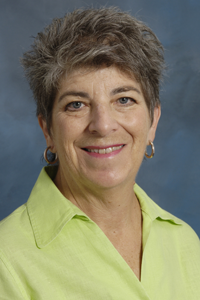Alzheimer's disease, related disorders will challenge the healthcare system, policies in the 21st century

Carol Cornman of the Office for the Study of Aging says baby boomers already are having an impact on the healthcare system as it relates to Alzheimer's disease.
November 17, 2011
Alzheimer's disease is the nation's next major health epidemic, say public health experts, and the forecast has serious implications for the Office for the Study of Aging at the Arnold School of Public Health.
OSA Director Carol Cornman recently paused to review the picture of Alzheimer's disease in South Carolina during early November, National Alzheimer's Disease Awareness Month. The annual observance is sponsored by the Alzheimer's Association to call attention to the plight of more than five million people who are living with Alzheimer's and their more than 10 million family caregivers
As of 2008, the last year for which data is available, almost 70,000 South Carolinians were suffering from Alzheimer's disease or a related disorder (ADRD), said Cornman, who believes that about 135,000 family caregivers are dealing with the devastating disease.
Cornman's statistics come from the S.C. Alzheimer's Disease Registry, which the Office for the Study of Aging maintains. Established in 1988, the registry was one of the nation's first registries and its information is considered the most comprehensive and most sophisticated. Because of that, health officials from other states have turned to the OSA for guidance in establishing similar registries.
The registry's numbers reveal that from 2004 - 2008 the number of individuals with ADRD increased an average of almost 3 percent each year. According to a recent analysis of registry trends, the greatest average yearly increase of 10.5 percent occurred in the age group 50 - 64, a "younger" age group in the ADRD spectrum, said Cornman.
"This has important implications since the baby boomers are arriving at this younger age group and seem to be driving the rate of the diagnosis upward," she said. "Either these cases are being recognized earlier or the disease is happening earlier than in the past. It is alarming."
With the impact of aging baby boomers looming large, the Alzheimer's Registry will expand its role as a tool to help assisted living providers, researchers, and government agencies to address the impact of the disease which unfortunately still has no cure.
Maintained in cooperation with the S.C. Department of Health and Human Services, the S.C. Department of Mental Health, the USC School of Medicine, and the S.C. Office of Budget and Control, ADRD data is available down to the ZIP code level Moreover, the data can even identify differences in disease prevalence among demographic groups, said Cornman.
In addition to maintaining the registry, the OSA offers education and training for Alzheimer's caregivers, healthcare professionals, law enforcement and others through a program named Dementia Dialogues.
Jan Merling, OSA's education coordinator, created Dementia Dialogues and has trained more than 16,000 persons over the past 10 years. The program was originally conceived to train workers in skilled nursing facilities, but interest in the subject has become so popular that Merling has found herself appearing before church groups, service clubs, and even law enforcement agencies. Architects and homeowners have sought Merling's expertise on how to design assisted living facilities and private residences to accommodate persons with Alzheimer's disease.
"This is an important outreach program because it has an impact on people throughout the state," Cornman said. "It's practical and relevant. It provides real-world application and support for caregivers who are trying to care for people with unique behaviors."
For more information on the S.C. Disease Registry, contact Carol Cornman at ccornman@sc.edu.



_01.jpg)
_02.jpg)